Water supply, feed challenges, rising costs worry pig farmers
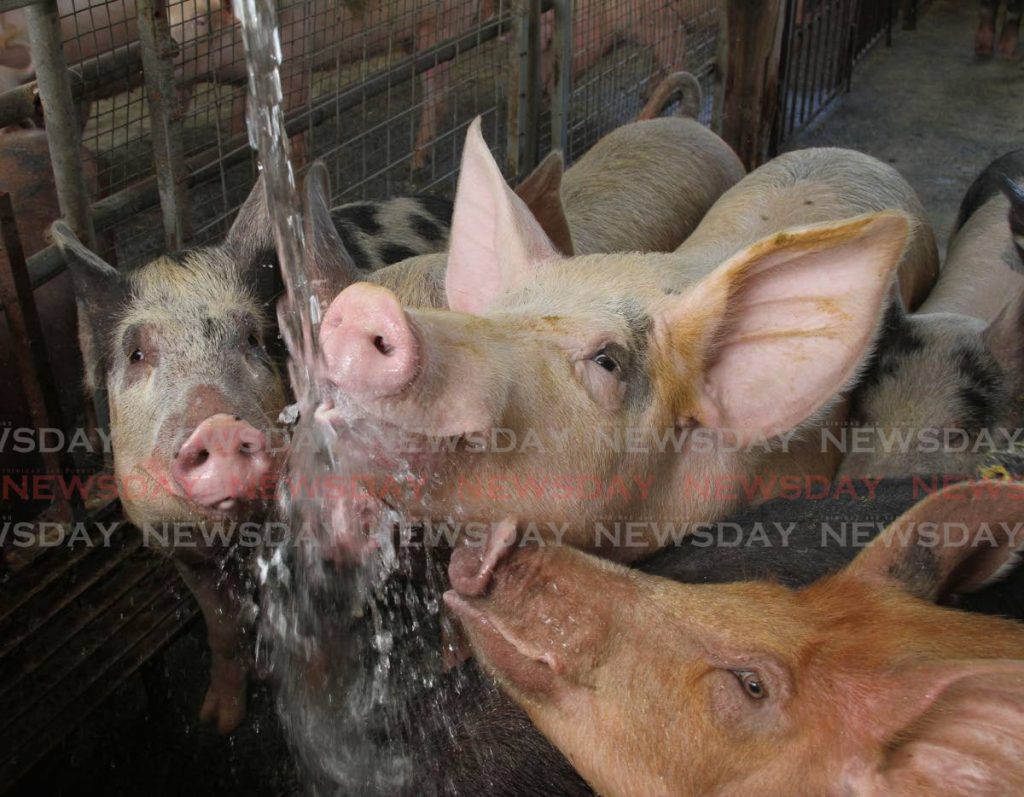
Elizabeth Buchan, a pig farmer for over 30 years, grabs firmly onto a broom and scrubs the ground of her Wallerfield, pig pen which is covered in mud and faeces. She has resorted to sweeping the pen instead of washing it down, because she did not have water for nine days.
Standing in the pig pen talking to Business Day, Buchan said she has to ration her water on account of a main which burst nearby. Daily she has to decide whether to keep the pen clean, or keep the water to ensure that her 30 piglets, five sows and one boar have clean drinking water.
“I can’t wash my pen with that water,” she said. “I have to give them that to drink. All the water I have now is for drinking purposes.”
Water is extremely important for raising healthy pigs, particularly during the nursing period, but like many farmers a consistent supply of water is hard to come by. That supply of water has become a worry for small scale pig farmers, who depend on markets and the Christmas season to sell their goods.
But a sporadic supply of water is not the only worry for pig farmers. Because of international shocks, climate change and disease, pig farmers now have to worry about keeping their pigs fed, hydrated and safe from sickness.
Water worries
A sow can birth between seven to ten piglets at a time, all of which would stay with their mother for up to six to seven weeks. During this time, water is essential for the piglets’ growth.
“The sows should have clean, running water to drink anytime they want,” said Brian Maturine, 35, who had been farming since he was ten. The six weeks a piglet spends nursing would determine the rate at which it grows. Depending on the breed of pig, whether the foreign-based Landrace and Duroc, or the local breed of pig, it could be ready for market within four to five months.
Water is also essential for keeping the pens free from diseases – a worry for Buchan.
“Of course we are worried about diseases,” she said. “I have to wash down the weaners with whatever little water I have to feed them because they can get sick quicker than the older ones. Anything passing they will catch it because they are young. The older ones are more resistant.”
And that worry is only exacerbated by the looming danger of African swine fever (ASF) – a disease for which government issued an alert in early August.
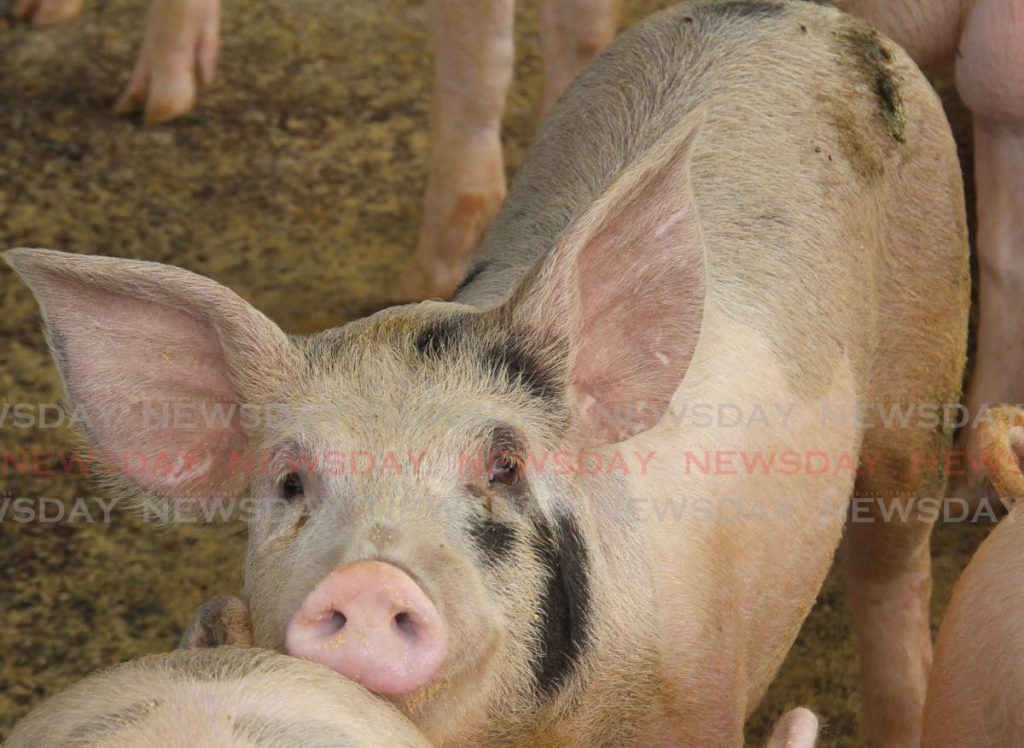
In a release on August 6, the ministry said the virus, 95-100 per cent fatal in pigs but non-lethal to humans, had entered the Dominican Republic.
“(Swine fever) can be spread by live or dead pigs and pork products,” the release said. “It can also be spread in food scraps and food waste generated by air and sea vessels.”
The release added that the virus could be spread through contaminated feed as well. Like covid19, it can survive on surfaces like shoes, clothes, vehicles and equipment for a number of days.
Also, like covid19, there is no cure for ASF – countries can only protect themselves through rigorous border control and biosecurity.
While the disease has not yet entered the country, government warned that the virus, because of how fast it spreads and kills, could decimate a pig farming industry.
“Ensuring that there is proper disposal of waste food from aircrafts, ships and vehicles and preventing the illegal entry of live pigs and pork products are therefore key national prevention measures,” the release said.
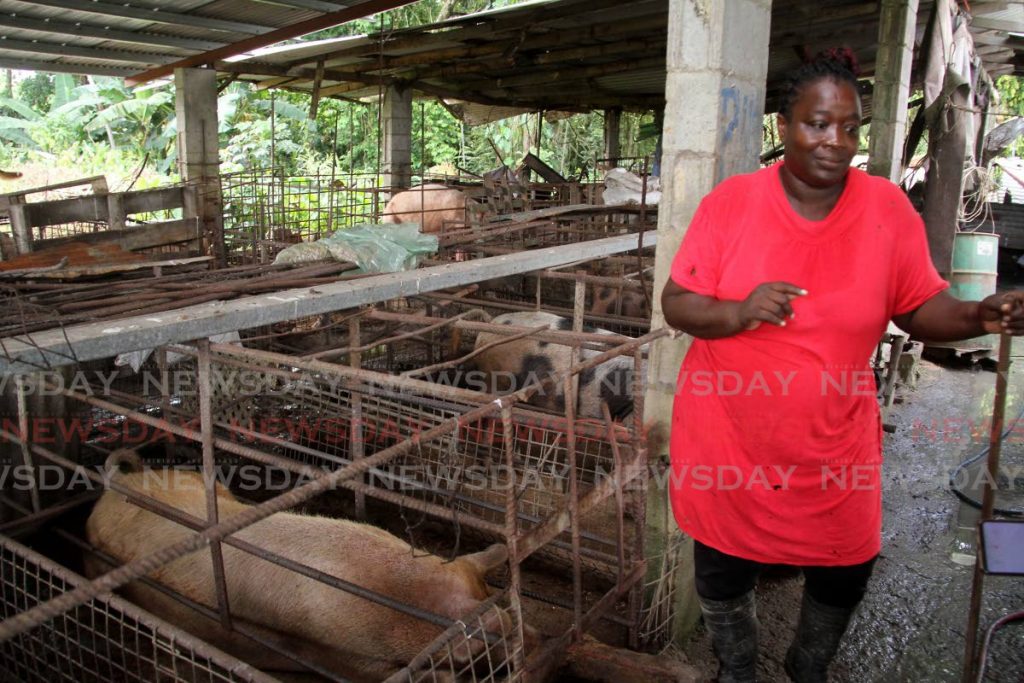
For larger farms like Smithfield Farms, supplier to MacFoods, biosecurity is at the centre of their process. The farm’s infrastructure, which included sanitation stations for people’s hands, feet and clothes, extractor fans and policies for the cleaning of waste and faeces, was only strengthened by covid19 measures which came into effect from as early as March 2020.
“For example, we do not allow outsiders onto the farm. Visits are by appointment only,” said a senior official of the farm. “We have sanitisation stations for your hands and feet and clothing. These were long in place before covid19. We are very strict when it comes to those kinds of things. Quality is in our name, so we cannot afford to let that deteriorate.”
But for smaller farms, biosecurity means keeping their pens clean – which means having a steady supply of water.
Former farmers union president Shiraz Khan said the water worries has left some farmers questioning whether they should continue with their trade.
“One day we will get flooded and on another day it will be so extremely hot that the animals will consume more water than normal,” he said.
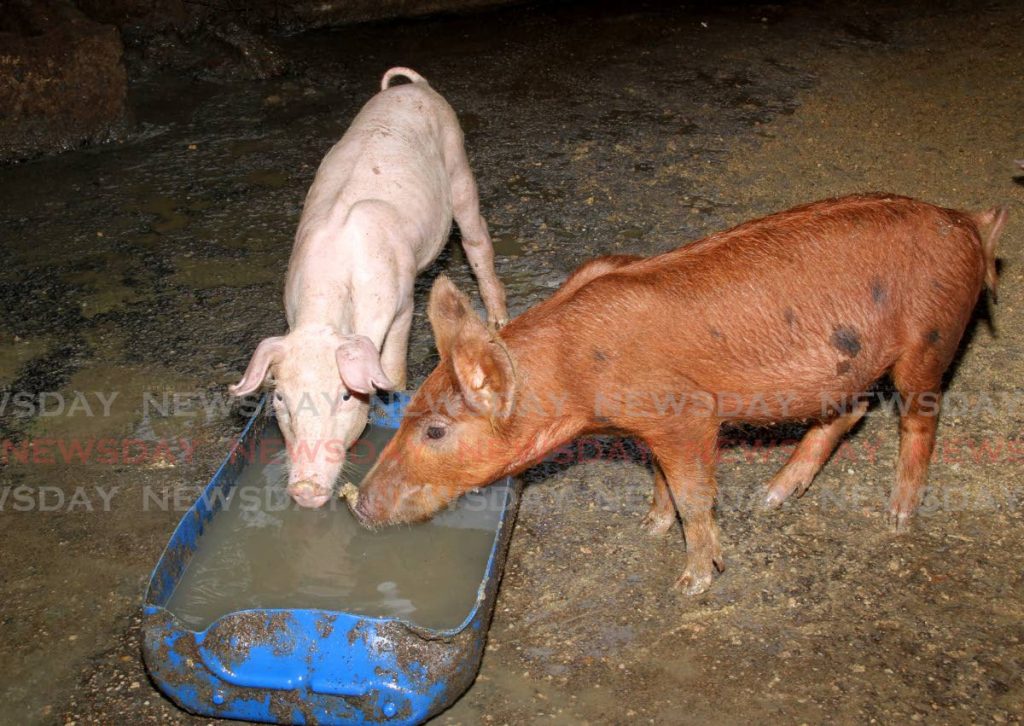
He said in years gone by farmers would have a storage of about 2,000 gallons of water in the event of a shortage but now that water is being consumed even more farmers have to spend more cash for pumps and water storage.
“The majority of farmers are state land farmers,” Khan said. “You cannot build a pond or pool water on your own. You have to get permission.”
Khan added that protecting not just pigs, but all livestock from diseases is dependent on the availability of water, even more so at a time when sanitisation and cleanliness is of the utmost importance.
“You want everyone to wash their hands and sanitise regularly, you want people to clean their environment regularly, but what is going on with the water? I have seen people protesting that they do not have water for two and three weeks. Even if you are vaccinated and you don’t have water to clean and sanitise your animal pens and so on, what is the point?”
Need for feed
In a roundabout way, local farmers have already been affected by swine fever. The fever which broke out in China in 2018 set off a chain reaction which now adds to several contributing factors making feed availability difficult and expensive.
The virus hit China hard spreading rapidly among farms in a country which is known for its consumption of pork.
Since the disease has no cure and there has been no approved vaccine, the only remedy for the virus is mass culling.
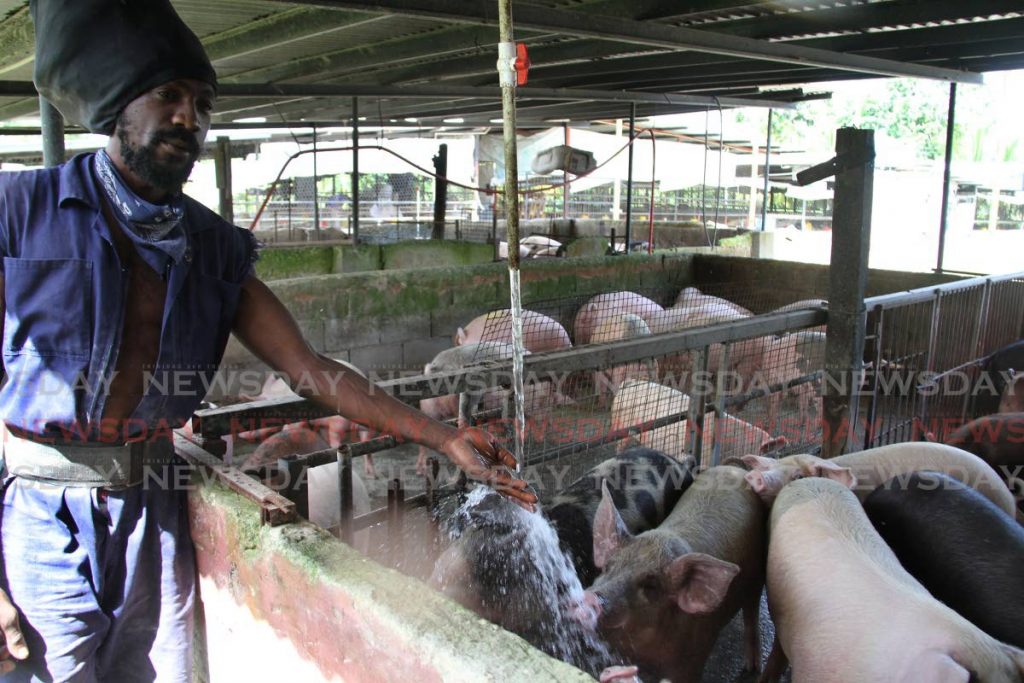
According to Fortune Magazine, the virus and the culling measures taken to stymie its spread gobbled up half the country’s pig population and cost the US$300 billion worldwide pork market as much as US$130 billion in losses.
In order to recover, China cornered the feed market. It also took over corn futures to feed its growing hog herd.
A Bloomberg report in May, citing information from the USDA, said that China has already snatched up 9.5 million metric tonnes of US corn from next year’s expected crops.
With China buying up all the feed and raw materials to make feed, grains and feed have become more expensive and that cost has now trickled down to local farmers.
“Feed is hard to get and what it has right now you have to pay big money for,” Buchan said. “All purpose was $50 a bag, now it is $100. In a split second it just flew up.”
She said at this point the all-purpose feed is the only thing available. To supplement her supply of feed, she would look for scraps.
“We will get Crix, wafers and coconut meal to feed them,” she said. “Right now you aren’t even getting scraps because the material they use to make that is also scarce.”
She said she has to resort to rationing the feed to the piglets, which she is raising to sell in time for Christmas.
Maturine said where he cannot get feed, he tries to be creative.
“I can’t get pellets for two or three weeks now,” he said. “With pigs you could supplement it in a way because there are local industries that would have some kind of waste that we could use. If you apply yourself you could supplement. But you have to have your farmer's badge and transport and so on.”
But Khan said even the prices of substitutes have skyrocketed. He told Business Day that at the beginning of 2021 farmers would buy rice brand – a rice by-product that would go into the feed – for $38-$40 a bag.
“That is being sold now at $80 a bag,” he said. “There were some farmers that would buy pet rice and boil it and feed their pigs. We used to buy pet rice at $130 a bag in early February. At this point in time a bag of pet rice is $250.”
“Now even minding dogs to protect your farm is more expensive because pet rice has gone up.”
Peak time for pigs
The issues facing farmers could not come at a worse moment, as the demand for pork in TT begins to increase around this time of the year.
Maturine told Business Day that although he goes to market every week of the year, it is around this time that customers will buy their piglets to fatten and raise for Christmas.
Within three days of a piglet’s birth they would be given a booster shot. The mother would be given antibiotics or local bush medicines to boost her immunity as well. The following four to five months, the pigs would be given feed, water and tender loving care until they are ready to be slaughtered.
However, the breed of the pig also determines how fast it grows. Maturine explained it in a simple equation: Good feed plus good breed equals good meat.
“If it is a small breed it may take longer and if you are using cheap feed it could take around six months and so on.”
Buchan, who sells weaners only, said during the year, butchers and other farmers would come to buy weaners, but around Christmas would be a peak time when both butchers and regular customers would buy.
She said so far for the month she hadn’t made any sales.
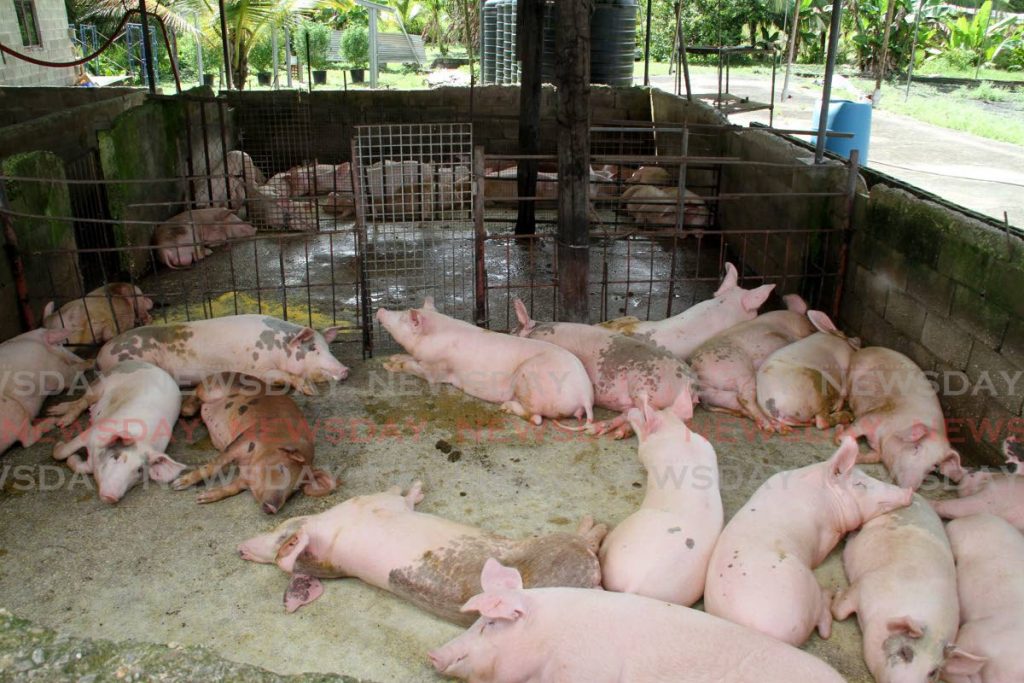
Smithfield Farms officials say they noticed an increase in demand for pork.
In 2018, TT was ranked 75th of 146 countries in terms of pork meat consumption, according to Helgilibrary.com with a consumption rate of 6.31 kg per capita.
For Smithfield Farms the demand for pork has raised by 75 per cent but officials said they believe that it has something to do with the restrictions put in place to combat covid19, which saw the closure of restaurants and fast food outlets causing people to do more cooking at home.
Water solutions
Minister of Public Utilities Marvin Gonzales told Business Day that pig farmers and farmers in general will soon benefit from initiatives in the development of a national water management system.
“What we are doing is to have an integrated water management system and programme for Trinidad and Tobago. And when we talk about that, we are looking at WASA providing water to all sectors of the national economy not only for domestic, consumer and commercial but providing for the agricultural sector,” he said.
He said currently there are water systems to provide a supply for some farmers but these may not be accessible to some who are not close by.
“WASA does not determine where a farmer undertakes his trade or rears his animals,” he said. “It all depends on the availability of land. So it has to be properly co-ordinated with the Ministry of Agriculture so that farmers undertake their trade in areas where they can get access to water.”
“But if the system is ad hoc where people just go and plant their crops or tend to their animals wherever there is land available it may not help because it may not necessarily be land approved for that purpose.”
One part of this integrated system that should be seen soon would be the use of waste water to supply to farmers. Gonzales said that by the end of the year wastewater treatment plants will be refurbished to convert wastewater to potable water for domestic and agricultural use.
“Most of the wastewater coming from our plants is normally put back into the watercourses, rivers, streams etc, and allowed to run off. A lot of that water can be utilised in support of the agricultural sector. In the East West Corridor we have the Malabar wastewater plant which is a recently constructed plant. There is another one being constructed in Trincity. There are a number of other plants owned and operated by WASA around TT where the quality of the wastewater is very good, where you can utilise it.”
He added that the integrated plan would also make use of run-off water produced by heavy rains and flooding. He added that since several wastewater treatment plants are already being refurbished putting together an integrated plan would not cost much.
He agreed with Khan, saying that WASA has not been putting its water to good use.
“This country is blessed with water resources, both ground and surface water and unfortunately we have not maximised it. The water is there, what we need to do is put the infrastructure in place to make use of it.”
Attempts to contact Agriculture Minister Clarence Rambharat were unsuccessful.

Comments
"Water supply, feed challenges, rising costs worry pig farmers"